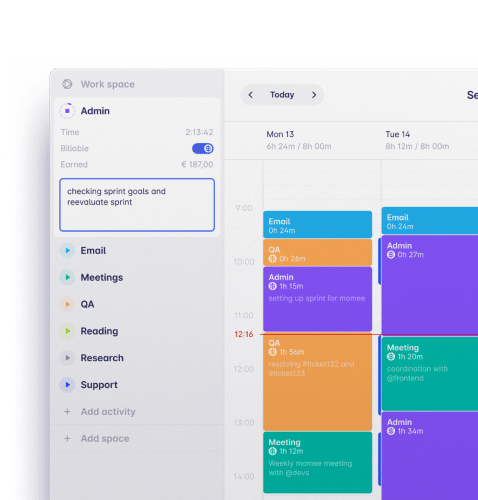What is a Remote Work Culture [with TIPS]
The pandemic has brought about drastic changes in the workplace, particularly with the adoption of remote work culture.
With technological advancements, employees can now work from anywhere, and it’s become increasingly important for companies to create a strong remote work culture to promote productivity and employee engagement.

Maximize your remote work productivity by tracking your time
“My time spent on revenue-generating projects has increased by ~10% each week.” – Angela Morisette, SVP Business Operations at Scratch Financial
As a manager, you may be wondering how to manage remote teams and create a strong culture for your team.
In this blog post, we’ll dive into the ins and outs of remote work culture and provide practical steps for you to build a thriving remote work environment.
What is remote work culture?
Remote work culture refers to the values, behaviors, and practices shaping how a team or organization operates when its members work from different locations, often using digital tools to communicate and collaborate. Remote work culture encompasses various aspects, such as communication, work-life balance, teamwork, productivity, and accountability.
Regardless of how your organization perceives work culture, it inevitably shapes every employee’s day-to-day experience.
Remote or not, company culture is important to focus on in order to have healthy, stable, and happy teams. However, it’s a huge challenge for many companies to translate company culture directly into a remote work environment.
Why is it important to build a healthy remote work culture?
Creating a strong remote culture requires a lot of effort and ongoing attention.
There are many reasons why building a healthy remote work culture is so important. Here are a few of what we believe to be the most important ones:
- Employee satisfaction, engagement, and productivity: it’s easy for remote workers to feel isolated and disconnected from their team members. By building a healthy remote work culture that promotes communication, collaboration, and teamwork, the overall satisfaction, engagement, and productivity of the employees can improve;
- Retention: even though we live in a fast-paced world and people are always looking for new challenges and opportunities. It’s more likely for a company to keep an employee for a longer period if the company has a good remote work culture. When employees feel supported, engaged, and valued, they are more likely to stay with their organization for the long term;
- Communication: communication is one of the most important aspects of remote work and also one of the biggest challenges of virtual teams. A healthy remote work culture can encourage open and transparent communication between people, which can reduce misunderstandings, conflicts, and misinterpretations. This allows people to have better relationships and work more smoothly with one another.
Now that we explained the top reasons why building a good remote work culture is so important, you must be wondering how to get started.
What are the most important remote work culture tips for building the perfect remote work culture? Don’t stress, we got you!
We’ve compiled a list of the best practices for building a great remote work culture.
How to build a strong culture with a remote team
As we’ve already mentioned, creating a healthy remote work culture can be challenging, it’s definitely not always a sea of roses. However, it is essential for the success of your team and the well-being of your employees, and that’s one of the most important things for any company.
To help you put this into practice, here are 10 tips on how to create a healthy and strong remote work culture.

1. Establish clear communication
Clear and consistent communication is key to maintaining a healthy work relationship, whether it’s remote or hybrid work.
Establish communication channels that work for every worker, such as email, chat, video calls, or project management tools.
Get to know the best tools to manage remote employees.
2. Promote feedback
Encourage open and honest feedback from everyone on the company and team, regardless of their position and work.
Make it safe for employees to voice their concerns or suggestions and pay extra attention to what they say. Take it into consideration and act on their feedback.
That’s why retrospective moments are crucial for company culture and development. If you are interested in this topic, we advise you to read our blog about retrospective ideas for remote teams.
3. Recognize and celebrate achievements
Speaking of promoting feedback, besides asking for it, you also must give it.
Recognizing and celebrating employee achievements and milestones will keep your teams motivated and productive.

4. Emphasize work-life balance
This is probably one of the most important tips when it comes to remote working.
Working remotely can blur the boundaries between work and personal life. So, if you’re a manager, you must encourage employees to take breaks and set clear expectations around work hours and response times.
If you see someone is clearly working over hours, make sure you don’t ignore the signs and say something.

Track work time and overtime to keep a healthy work-life balance
Timeular helps you to track time with zero effort, within a few seconds per day
Read our post to find the best ways to improve work-life balance.
5. Nurture trust
Trust is essential for a healthy remote work culture. Build trust by setting clear expectations and providing support and guidance to your workers when needed.
6. Provide work equipment
It’s essential to make sure your team has access to the right resources and support they need to do their jobs effectively, such as technology and training materials.
It’s the company’s duty to provide all the necessary equipment for their employees.
7. Be flexible
As a good team leader you should lead your team by showing flexibility. This will improve your team performance.
It’s critical to know everyone has a personal life and private matters. Giving people flexibility over their hours and location will empower your remote work culture because everyone wants an excellent work-life balance.
8. Encourage collaboration
Encourage collaboration among team members to make sure everyone knows each other and gets along!
Employees will feel much happier communicating with colleagues by promoting an environment where everyone feels comfortable sharing ideas and working together.
Read our post and find out how teamwork affects productivity.

9. Prioritize your employee’s well-being
It’s essential to prioritize employee well-being by offering mental health resources, encouraging self-care breaks and activities, and promoting healthy habits like exercise.
Create times to meet virtually with your team. There are a lot of great virtual team-building activities to promote an excellent remote culture.
10. Have 1-on-1s regularly
It’s essential to hold regular meetings with employees to build connections and establish trust.
If you’re a leader, a project manager, or an HR professional, you must schedule these 1-on-1s.
When you have more frequent contact with your employees, you can quickly answer their questions and help them with their work. At the same time, you can communicate your expectations, make sure they’re happy and motivated, and so on.
Make 1-on-1s a priority to stay updated on your employees’ performance and motivation levels.

11. Create an efficient onboarding process
This is often forgotten, but it’s valuable for employees to feel welcomed in their jobs. However, creating a practical onboarding process for remote employees can be tricky.
Don’t expect that in-person onboarding processes work for remote employees. Instead, we suggest you design your onboarding process around the virtual experience, to make it more accurate.
12. Create a digital playbook
Developing transparency is crucial for a remote organization.
Developing a digital playbook is a good strategy for building a remote work culture. This book should be accessible to all our staff, and it can contain the following:
- vision;
- mission;
- roles and responsibilities;
- ways of working.
In some cases, if you want full transparency and trust, it might be a good idea to list staff salaries and how you’ve calculated each one.
Conclusion
In conclusion, we hope these tips helped you better understand how you can build a strong remote work culture and have everyone on the same page and spread the company’s ideas to the rest of the team.
As remote work grows, it’s imperative for businesses to build cohesive remote teams to improve project delivery, enhance profitability, and achieve all business goals.
When your values and mission drive your remote team, they’ll have a clear purpose and expectations to motivate them. Creating a solid remote work culture ensures employees feel connected, engaged, and supported, regardless of location.
Ultimately, a strong remote work culture can have great benefits for companies, including increased productivity, higher employee satisfaction, and reduced staff turnover.
By prioritizing remote work culture and investing in the tools and resources needed to support it, organizations can create a virtual workplace that is both productive and fulfilling for every employee!
FAQ
Yes, remote work can be very effective. Several examples of companies that have successfully implemented remote work environments: Automattic, InVision, and Coalition Technologies, belong to Forbes’ list of Top 30 Companies For Remote Jobs.
Yes, it does. Read our post, if you want to know how remote work increases productivity.
It depends. Whether or not you can work remotely internationally depends on several factors, including your nationality, visa status, and the regulations of the country where you want to work. It would be best if you did deep research on these topics to learn more about them.
Many resources are available to find remote work jobs, such as LinkedIn and Remote.co, We Work Remotely, FlexJobs, and Remote OK. You can also get many great options to work as a freelancer, such as Upwork, Freelancer, and Fiverr.
There are many reasons why managers fear remote working. It can be a loss of control on their part, the many communication challenges that come with it, trust issues, and concerns about employee productivity.
You might be interested in: